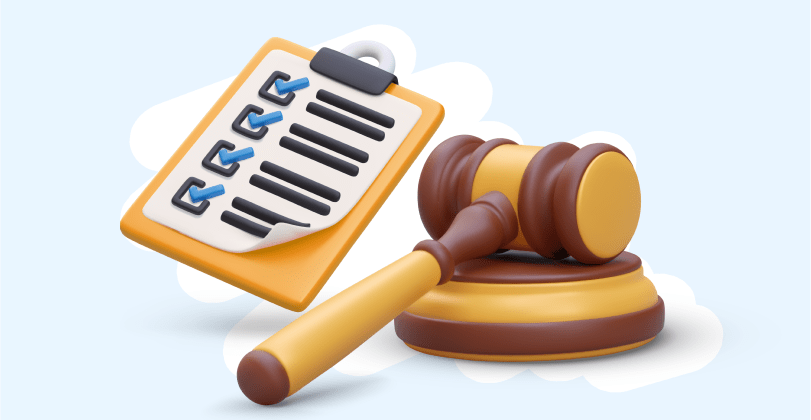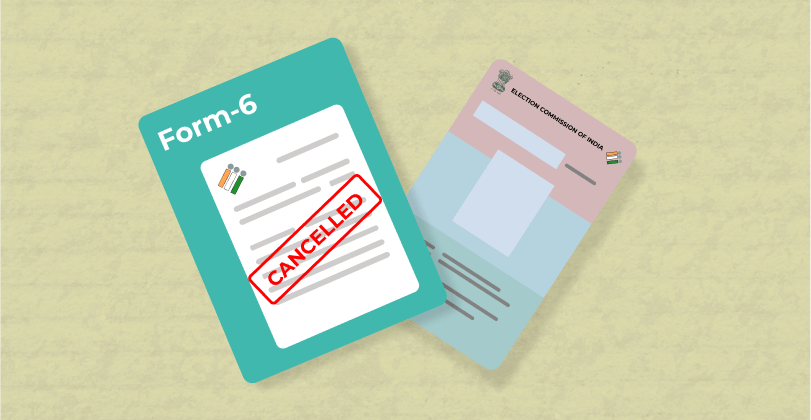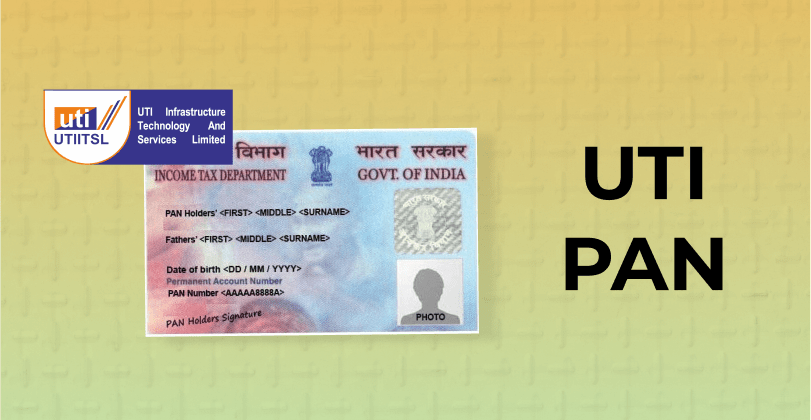Elections in India, the world's largest democracy, are a grand exercise of the people's will, reflecting the diverse voices of over 96.88 crore registered
Elections in India, the world's largest democracy, are a grand exercise of the people's will, reflecting the diverse voices of over 96.88 crore registered voters. The robustness of this democratic process hinges on a comprehensive framework of election rules designed to ensure transparency, fairness, and integrity.
From the intricate details of voter registration to the stringent regulations overseeing political campaigns, these laws form the backbone of India's electoral system. Understanding these laws is crucial not only for candidates and political parties but also for every citizen who participates in shaping the nation's future.
Let’s understand the key aspects of India's election rules, offering a detailed exploration of how they uphold the sanctity of the democratic process.
What are the Election Rules in India?
Election rules in India constitute a comprehensive legal framework designed to ensure free, fair, and transparent elections. These laws encompass a wide array of regulations and guidelines governing every aspect of the electoral process. Key among them are the Representation of the People Acts of 1950 and 1951, which detail the preparation of electoral rolls, the conduct of elections, and the adjudication of election disputes.
Additionally, the Election Commission of India (ECI), established by the Constitution, plays a pivotal role in overseeing and enforcing these laws. The ECI issues the Model Code of Conduct to regulate the behaviour of political parties and candidates during elections. Together, these laws and regulations safeguard the integrity of the electoral process, ensuring that democracy in India functions effectively and inclusively.
How do Election Rules Work in India?
Election rules in India function through a well-defined and structured process aimed at ensuring democratic fairness and integrity. Here’s how they work:
-
Election Commission of India (ECI):
The ECI supervises and conducts elections, ensuring compliance with all legal provisions. -
Voter Registration:
The Representation of the People Act 1950 governs the preparation and maintenance of electoral rolls, ensuring all eligible citizens are registered. -
Candidate Nomination:
The Representation of the People Act, 1951, sets out detailed procedures for candidate nominations, including qualifications and disqualifications. -
Campaign Regulations:
The ECI's Model Code of Conduct regulates the conduct of political parties and candidates during the election period. -
Electronic Voting Machines (EVMs):
EVMs are used to ensure secure and efficient voting. They minimise errors and expedite the counting process, enhancing transparency. -
Polling and Counting:
Strict procedures are followed for voting rules in India to ensure transparency and accuracy. -
Dispute Resolution:
Election disputes are adjudicated by the judiciary, ensuring any grievances are addressed fairly.
These elements collectively ensure that elections in India are conducted smoothly, fairly, and transparently.
What Are the Major Types of Elections in India?
India, the world's largest democracy, conducts various types of elections to ensure representation at different levels of government. The major types include:
-
General Elections:
These are held every five years to elect members of the Lok Sabha, the lower house of Parliament. They determine the composition of the central government. -
State Legislative Assembly Elections:
Also held every five years, these elections choose representatives for the Vidhan Sabha, the legislative assembly of each state. -
Rajya Sabha Elections:
Members of the Rajya Sabha, the upper house of Parliament, are elected by the elected members of State Legislative Assemblies. -
Presidential and Vice-Presidential Elections:
These are indirect elections where elected members of Parliament and State Legislative Assemblies vote. -
Local Body Elections:
Held for urban and rural local governance, including municipal corporations, panchayats, and other local bodies.
Each type of election plays a crucial role in maintaining the democratic fabric of the nation.
What Are the Election Requisites in India?
India's electoral system is built on several key requisites to ensure its democratic integrity:
-
Free and Impartial Authority:
The Election Commission of India (ECI) is an autonomous body responsible for conducting elections. It operates independently to prevent undue influence from the executive branch of the government and ensure free and fair elections. -
Redressal Mechanism:
A robust mechanism is in place to address election-related grievances. Courts and election tribunals handle disputes, offering candidates and voters a legal avenue to challenge electoral malpractices or discrepancies. -
Rules and Regulations:
The electoral process is governed by a comprehensive set of election rules and regulations, including the Representation of the People Acts and the Model Code of Conduct. These laws cover everything from voter registration and candidate nominations to campaign conduct and polling procedures.
These requisites collectively uphold the transparency, fairness, and efficiency of India's electoral system.
Functioning of the Election Commission of India
The Election Commission of India (ECI) is an autonomous constitutional authority entrusted with overseeing the conduct of elections in the country. Its functioning is pivotal to ensuring free, fair, and transparent elections. Here’s how the ECI operates:
-
Administrative Oversight:
The ECI administers elections to the Lok Sabha, Rajya Sabha, state legislative assemblies, and the offices of the President and Vice President. -
Electoral Rolls Management:
It manages the preparation and revision of electoral rolls to ensure all eligible citizens can exercise their right to vote. -
Model Code of Conduct:
The ECI enforces the Model Code of Conduct, which regulates the behaviour of political parties and candidates during elections to maintain a level playing field. -
Dispute Resolution:
The ECI adjudicates election disputes impartially, ensuring grievances are addressed promptly. -
Educational Initiatives:
It conducts voter awareness programmes to enhance electoral participation and promote informed voting.
Through its impartiality and diligence, the ECI upholds the democratic principles enshrined in the Indian Constitution, making it a cornerstone of India’s electoral democracy.
Acts and Rules Relating to the Election Laws in India
India’s electoral framework is governed by a series of acts and rules designed to ensure the smooth conduct of elections and uphold democratic principles. Key legislation includes:
-
Presidential and Vice-Presidential Elections Act, 1952:
Defines the procedures for the election of the President and Vice-President of India. -
Presidential and Vice-Presidential Elections Rules, 1974:
Detail the specific rules and procedures for conducting presidential and vice-presidential elections. -
Representation of the People Act, 1950:
This Act governs the preparation and revision of electoral rolls, ensuring eligible citizens are registered to vote. -
The Registration of Electors Rules, 1960:
Provides detailed guidelines for the registration of electors and maintenance of electoral rolls. -
Representation of the People Act, 1951:
Covers the conduct of elections, including qualifications and disqualifications of candidates, election petitions, and other procedural aspects. -
Conduct of Elections Rules, 1961:
These rules specify the detailed procedures to be followed during elections to ensure fairness and transparency. -
Election Symbols (Reservation and Allotment) Order, 1968:
This order regulates the reservation and allotment of symbols to political parties and candidates. -
Model Code of Conduct:
Issued by the Election Commission of India, it lays down guidelines for conduct during elections to ensure fair play and ethical behaviour by political parties and candidates.
These acts and rules collectively form the legal framework that governs elections in India, ensuring democratic principles are upheld and the electoral process remains transparent and accountable.
Get Informed: Understand and Participate in India's Democratic Process
Election laws in India form the backbone of the world's largest democracy, ensuring fairness and transparency. These laws encompass voter registration, campaign regulations, and the use of Electronic Voting Machines (EVMs), among other aspects. The Election Commission of India (ECI) plays a crucial role in overseeing and enforcing these rules.
Key legislation, such as the Representation of the People Acts, further bolsters the integrity of the electoral process. Understanding these laws is essential for maintaining the democratic ethos of the nation.
Before You Go…
Need quick funds? KreditBee's Instant Personal Loan is designed to provide you with immediate financial assistance. Whether it's for medical emergencies, travel, or unexpected expenses, you can get a loan approved and disbursed within minutes.
FAQs
The Model Code of Conduct (MCC) is a set of guidelines issued by the Election Commission of India (ECI) to regulate the conduct of political parties and candidates during elections. It aims to ensure free and fair elections by preventing malpractices such as bribery, corruption, and misuse of government machinery.
EVMs are electronic devices used to facilitate secure and efficient voting in Indian elections. They ensure accuracy in counting and minimise the chances of tampering. Each EVM is programmed with a list of candidates, and voters select their choice by pressing a button next to the candidate's name.
According to the Representation of the People Act, 1951, candidates must fulfil certain qualifications, such as being a citizen of India, not holding an office of profit under the government, and not being disqualified under any law. Disqualifications can occur due to criminal convictions, corrupt practices, or defection under the Anti-Defection Law.
The ECI ensures fair elections by overseeing the entire electoral process, including voter registration, candidate nominations, campaigning, polling, and vote counting. It enforces the Model Code of Conduct, resolves disputes impartially, and conducts voter awareness programmes to promote informed participation.
Electoral offences such as bribery, undue influence, booth capturing, and false statements are punishable under various provisions of the Indian Penal Code and the Representation of the People Act. Penalties can include imprisonment, fines, and disqualification from contesting elections.
AUTHOR
KreditBee As a market leader in the Fintech industry, we strive to bring you the best information to help you manage finances better. These blogs aim to make complicated monetary matters a whole lot simpler.







